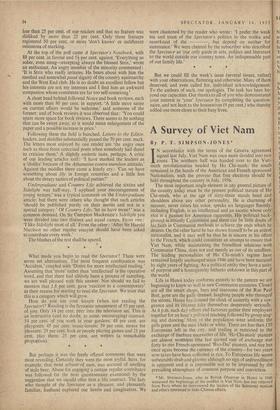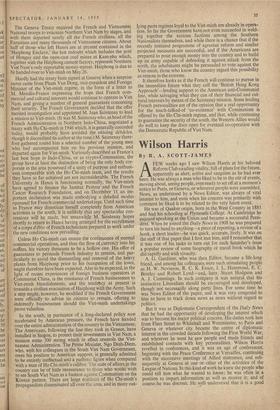A Survey of Viet Nam
By P. T. SIMPSON-JONES* IN accordance with the terms Of the Geneva agreement signed last July, Viet' Nam was once more divided into two zones. The northern half was handed over to the Viet- minh revolutionaries headed by Ho Chi-minh: the south remained,in the hands of the American and French sponsored Nationalists, with the proviso that free elections should be held throughout the country in July, 1956. The most important single element in any general picture of the country today must be the present political stature of 'Ho Chi-minh, who at the age of sixty-three stands head and shoulders above any other personality. He is charming of manner, never raises his voice, speaks six languages fluently, including English, is an intellectual and an ascetic whose only vice is a passion for American cigarettes. His political back- ground is entirely CoMmunist and there can be little doubt of his faith in Communist methods to achieve the ends which he desires. On the other hand he has shown himself to be an ardent nationalist, and it may well be that he is sincere in his offers to the French, which could constitute an attempt to ensure that Viet Nam, while maintaining the friendliest relations with Communist China, does not end merely as one of its satellites. The leading personalities of Ho Chi-minh's regime have remained largely unchanged-since 1946 and have been matured by eight years of fighting. As a political entity they have a unity of purpose and it homogeneity hitherto unknown in this part of the world.
Life in Hanoi today conforms entirely to the pattern we are beginning to know sowell in new Communist countries. Closed are all the smart shops, bars and tearooms of the Rue Paul Bert, gone are the gaily dressed, laughing people who thronged the streets. Hanoi has donned the cloak of austerity with a ven- geance and its Citizens take themselves desperately seriously. At 4 p.m. each c4 offices and factories gather their employees together for an hour's political teaching followed by group sing- ing and dancing: Most of the population wear uniform, the girls green and the men khaki or white. There are less than 150 Europeans left in the city, and trading is restricted to the exchange of therbare necessities of life. 'Ho Chi-minh' piastres are almost worthless (the last quoted rate of exchange was forty to one French-sponsored Tao-Dal' piastre), and rice has once again become the currency of the country—for two years now taxes have been collected in rice. To Europeans life seems unbearably drab and gloomy although no sign of unfriendliness is apparent and it is impossible not to be impressed by the prevailing atmosphere of common purpose and conviction.
---- * Mr. Simpson-Jones, who as British Observer in Hanoi in 1946
witnessed the beglnnings of the conflict in Viet Nam, has just returned from Paris where he interviewed the leaders of the Saintenay mission and others interested in Indo-Chinese affairs.
The Geneva Treaty required the French and Vietnamese National troops to evacuate Northern Viet Nam by stages, and with them departed nearly all the French civilians, all the Eurasians and many thousands of Vietnamese citizens. About half of those who left Hanoi are at present contained in the 'Haiphong Enclave,' the last redoubt which includes the port of Hongay and the open-cast coal mines at Kam-pha which, together with the Haiphong cement factory, represent Northern Viet Nam's only exportable money-earner. Haiphong is due to he handed over to Viet-minh on May 26.
Hardly had the treaty been signed at Geneva when a surprise move came from Pham Van Dong, vice-president and Foreign Minister of the Viet-minh regime, in the' form of a letter to M. Mendes-France expressing the hope that French com- mercial and cultural interests would continue to operate in Viet Nam, and giving ,a number of general guarantees concerning their security. The French Government decided that the offer merited investigation and appointed M. Jean Saintenay to lead a mission to Viet-minh. (It was M. Saintenay who, as head of the French Administration in Northern Indo-China, negotiated a treaty with Ho Chi-minh in 1946 which, it is generally conceded today, would probably have avoided the ensuing debacles, though it discredited its author at the time.) M. Saintenay there- fore gathered round him a selected number of the young men who had accompanied him on his previous mission, and departed again for Viet-minh. Variously.described as France's last best hope in Indo-China. or as crypto-Communists, the group have at least the distinction of being the only body cor- porate in the area possessed of a unity of purpose and enthusi- asm comparable with the Ho Chi-minh team, and the results they have so far achieved are not inconsiderable. The French University in Hanoi is functioning normally, the Viet-minh have agreed to finance the Institut Pasteur and the French Cancer Research Foundation, and on December 11 an im- portant declaration was made embodying a detailed modus operandi for French commercial undertakings. Until such time as France may dissociate herself completely from American activities in the south, it is unlikely that any spectacular con- cessions will be made, but meanwhile M. Saintenay hopes shortly to return to Hanoi having arranged for the recruitment of a corps d'elite of French. technicians prepared to work under the new conditions now prevailing.
Unless Ho Chi-minh can ensure the continuance of normal commercial operations, and thus the flow of currency into his coffers, his victory threatens to be a hollow one. His offer of guarantees to persuade French industry to remain, and par- ticularly to avoid the dismantling and removal of the heavy plants from Haiphong prior to his occupation of the town, might therefore have been expected. Also to be expected, in the light of recent experiences of foreign business •operators in Communist China, is the resistance ,of French businessmen to Viet-minh blandishments, and the tendettcy at present is towaids a civilian evacuation of Haiphong with the Army. Such a step might. however, be modified if the French Government were officially to advise its citizens to remain, offering to indemnify businessmen should the Viet-minh undertakings prove valueless.
In the south, in pursuance of a long-declared policy now accelerated by American pressure, the French have handed over the entire administration of the country to the Vietnamese. The Americans, following the line they took in Greece, have installed in Saigon, to protect their investments in Viet Nam, a mission some 300 strong which in effect controls the Viet- namese Administration. The Prime Minister, Ngo Dinh-Diem, who, with his colleagues in the South Viet Nam Government, owes his position to American support, is generally admitted to be entirely ineffectual and a pathetic figure when compared with a man of Ho Chi-minh's calibre. The state of affairs in the country can be of little reassurance to those who woulo wish to see South Viet Nam as a bastion against Communism on the Korean pattern. There are large numbers of Ho Chi-minh's propagandists disseminated all over the area, and in many out- lying parts regimes loyal to the Viet-minh are already in opera- tion. So far the Government have not even succeeded in weld- ing together the various factions among the Southern Nationalists themselves, and while there is a chance that if the recently initiated programme of agrarian reform and similar projected measures are successful, and if the Americans are prepared to pour enough money into the country and to build up an army capable of defending it against attack from the north, the inhabitants might be persuaded to vote against the Viet-minh, those who know the country regard this possibility as remote in the extreme.
It therefore looks as if the French will continue to pursue in the immediate future what they call the 'British Hong Kong Approach'—lending support to the American anti-Communist line, while salvaging ,what they can .of their financial and cul- tural interests by means of the Saintenay mission. Some leading French personalities are of the opinion that a real opportunity for the much-talked-of 'co-existence' with Communism is offered by the Ho Chi-minh regime, and that, while continuing to guarantee the security of the south, the Western Allies would do well to keep the door open for eventual co-operation with the Democratic Republic of Viet Nam.



































 Previous page
Previous page